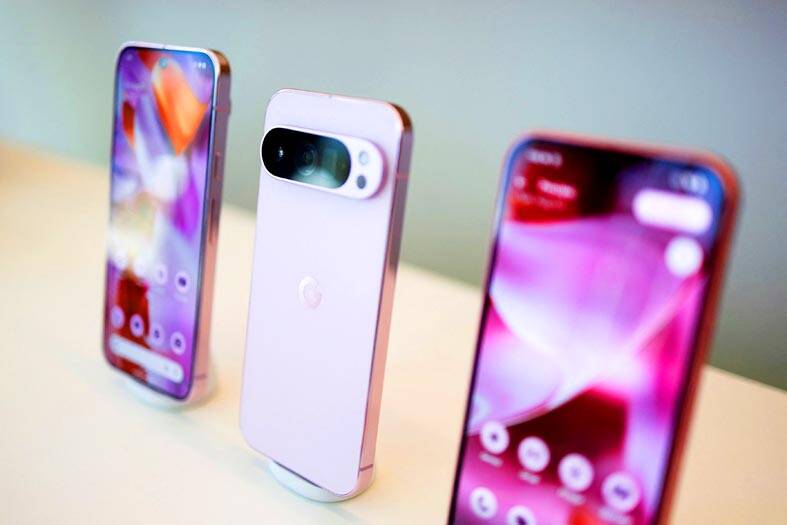Tech giant Google on Tuesday unveiled its new Pixel 9 smartphone series, which includes artificial intelligence (AI) technology, announcing that they would hit Taiwan shelves on Thursday next week.
The Pixel 9 series could help consumers better envision the potential of artificial intelligence, analysts said.
The phones are also expected to boost Google’s competitiveness against Apple Inc, which has teamed up with OpenAI to develop AI applications for iPhones, they said.

Photo: Reuters
The Pixel weaves users more tightly into Google’s online services, taking a page from Apple’s strategy with the iPhone and App Store.
The Pixel 9 models use Google’s Gemini AI capabilities, offering consumers an alternative to the iPhone’s Apple Intelligence AI.
The entry model Pixel 9 with a 6.3-inch Actua display, the more advanced 6.3-inch Pixel 9 Pro, and the 6.8-inch Pixel 9 Pro XL, would be available in Taiwan at starting prices of NT$26,490, NT$33,490 and NT$39,990, respectively, Google said.
The Pixel 9 Pro Fold — the second generation of Google’s foldable smartphone — is scheduled to go on sale in Taiwan on Sept. 4 with a starting price of NT$56,990, the company said.
Pixels account for a tiny sliver of the global smartphone market dominated by Samsung Electronics Co and Apple, but Google said that its new line is a chance to answer what — after all the hype — AI can actually do for customers.
“I understand people’s skepticism,” Google senior vice president of devices Rick Osterloh said at the company’s campus in Mountain View, California, on Tuesday.
“There have been so many promises, so many ‘coming soons,’ and not enough real-world helpfulness when it comes to AI — which is why today we’re getting real,” Osterloh said.
However AI-infused Pixels also raise questions about how well Google is safeguarding personal data and how regulators would react to the tech giant’s push to make users even more dependent on its platform.
A US judge last week handed Google a major legal blow, ruling in a landmark antitrust case that it has maintained a monopoly with its dominant search engine.
Google said it has prioritized privacy, from protecting data used by its AI to letting users create password-protected private spaces for apps and other content.
Pixel 9 models let Gemini AI handle personal requests, sending no sensitive information off the device, it said.

Taiwan’s long-term economic competitiveness will hinge not only on national champions like Taiwan Semiconductor Manufacturing Co. (TSMC, 台積電) but also on the widespread adoption of artificial intelligence (AI) and other emerging technologies, a US-based scholar has said. At a lecture in Taipei on Tuesday, Jeffrey Ding, assistant professor of political science at the George Washington University and author of "Technology and the Rise of Great Powers," argued that historical experience shows that general-purpose technologies (GPTs) — such as electricity, computers and now AI — shape long-term economic advantages through their diffusion across the broader economy. "What really matters is not who pioneers

In a high-security Shenzhen laboratory, Chinese scientists have built what Washington has spent years trying to prevent: a prototype of a machine capable of producing the cutting-edge semiconductor chips that power artificial intelligence (AI), smartphones and weapons central to Western military dominance, Reuters has learned. Completed early this year and undergoing testing, the prototype fills nearly an entire factory floor. It was built by a team of former engineers from Dutch semiconductor giant ASML who reverse-engineered the company’s extreme ultraviolet lithography (EUV) machines, according to two people with knowledge of the project. EUV machines sit at the heart of a technological Cold

TAIWAN VALUE CHAIN: Foxtron is to fully own Luxgen following the transaction and it plans to launch a new electric model, the Foxtron Bria, in Taiwan next year Yulon Motor Co (裕隆汽車) yesterday said that its board of directors approved the disposal of its electric vehicle (EV) unit, Luxgen Motor Co (納智捷汽車), to Foxtron Vehicle Technologies Co (鴻華先進) for NT$787.6 million (US$24.98 million). Foxtron, a half-half joint venture between Yulon affiliate Hua-Chuang Automobile Information Technical Center Co (華創車電) and Hon Hai Precision Industry Co (鴻海精密), expects to wrap up the deal in the first quarter of next year. Foxtron would fully own Luxgen following the transaction, including five car distributing companies, outlets and all employees. The deal is subject to the approval of the Fair Trade Commission, Foxtron said. “Foxtron will be

INFLATION CONSIDERATION: The BOJ governor said that it would ‘keep making appropriate decisions’ and would adjust depending on the economy and prices The Bank of Japan (BOJ) yesterday raised its benchmark interest rate to the highest in 30 years and said more increases are in the pipeline if conditions allow, in a sign of growing conviction that it can attain the stable inflation target it has pursued for more than a decade. Bank of Japan Governor Kazuo Ueda’s policy board increased the rate by 0.2 percentage points to 0.75 percent, in a unanimous decision, the bank said in a statement. The central bank cited the rising likelihood of its economic outlook being realized. The rate change was expected by all 50 economists surveyed by Bloomberg. The